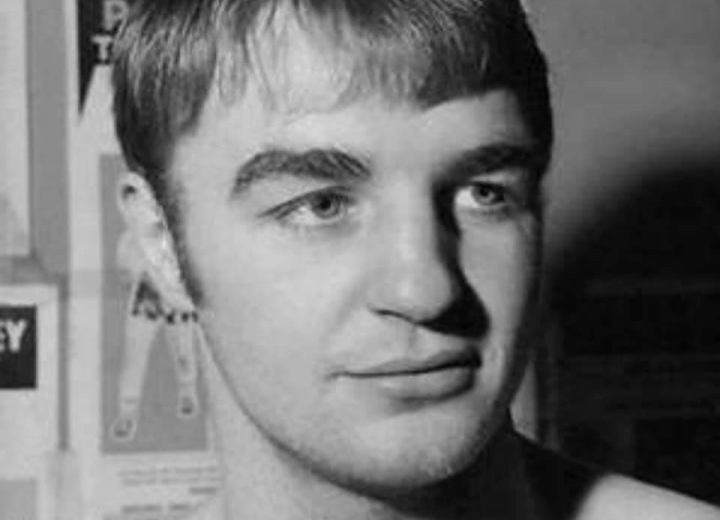As the first Irishman to hold the British heavyweight title, Danny McAlinden holds a place in boxing history. And while no one will ever mistake McAlinden for a boxing great, he was British heavyweight champion at a time when that meant his name was known in a vast number of households in the country.
McAlinden’s death, at the age of 73, was announced on Monday. By coincidence it was #the 50th anniversary of one of his most famous wins. On March 8 1971, Joe Frazier was not the only boxer to beat a man called Ali at Madison Square Garden. On the undercard to The Fight Of The Century, McAlinden recorded a points victory over Muhammad Ali’s brother, Rahman.
In the years between Joe Bugner beating Henry Cooper and Frank Bruno raised the nations hopes, McAlinden was one of a string of boxers to briefly be the next big hope of Britain.
McAlinden held the British and Commonwealth titles for 2½ years, although he lost the belts in his first defence. But he wasn’t the only one. From 1971 until 1985, Bugner, Jack Bodell, McAlinden, Bunny Johnson, Richard Dunn, John L Gardner, Gordon Ferris, Neville Meade, David Pearce and Hughroy Currie made a grand total of two successful defences of the British heavyweight title between them.
It was all quite a change from Cooper, who had become so attached to the British title that he won three Lonsdale Belts outright, the first and last boxer to achieve such a feat.
McAlinden was born in Newry, but moved to England to live in Coventry when he was still of school age, boxing at the Edgwick Amateur Club. He won a bronze medal for Northern Ireland at the 1966 Commonwealth Games in Jamaica in 1966 and boxed at the European Championships in Rome a year later.
He turned professional, managed by George Middleton, and the fighter who became known as “Dangerous Dan” began to make something of a stir with a rough and ready uncompromising style.
His first three professional outings all came on the same night in 1969, winning a heavyweight tournament at promoter Jack Solomons’s World Sporting Club in London. Also making his debut in that tournament was another future British champion and future opponent of Muhammad Ali, Richard Dunn. The pair met in the semi-final and McAlinden knocked him out in the first round.
The only defeat in his first 23 fights came via a narrow decision to huge American Jack O’Halloran and after beating Rahman Ali, he began to call out his big brother, Muhammad, questioning his heart and saying he was washed up. Rahman was not the only famous brother McAlinden faced. He also drew with Floyd Patterson’s brother, Ray.
The fight never happened, but when McAlinden went on to challenge Jack Bodell for the British and Commonwealth titles in the summer of 1972, it was such a big fight it was staged outdoors at Villa Park, the football ground of Aston Villa. It was a big rivalry, Bodell, a fellow Midlander, had claimed the titles from Bugner the year before, although he was then knocked out by Jerry Quarry.
McAlinden went at him from the opening bell in a wild fight, that saw Bodell knocked down four times and the pair wrestle each other tp the canvas numerous times. In the second round, Bodell was dropped flat on his face and, as the fight was waved off, the ring was invaded by McAlinden’s fans who held him aloft.
There was talk of a fight wit Bugner, who had regained the European title, while after George Foreman claimed the world title from Frazier, McAlinden was being mentioned as a possible challenger. McAlinden, however, suffered an upset loss to Morris Jackson and then became embroiled in a contract row with Solomons and, after the British Boxing Board of Control ruled in favour of the promoter, he was forced to buy himself out of his contract for £10,000.
Instead of getting the bog fights, though the Board insisted that he defend the British title against Johnson. Solomons won the rights to stage the fight and put it on at the World Sporting Club in front of a dinner audience of less than 1,000, McAlinden receiving a purse of just £8,650. Johnson dominated the early rounds with the jab, although he was dropped by a left hook in the fourth round. From then on, though, Johnson took control and knocked him out in the ninth round.
He went on to challenge Dunn for the British title in 1975, but was down three times as he was knocked out in the second round. He boxed on for another six years, losing more than he won, although he did claim the Northern Irish title.
Ron Lewis is a senior writer for BoxingScene. He was Boxing Correspondent for The Times, where he worked from 2001-2019 - covering four Olympic Games and numerous world title fights across the globe. He has written about boxing for a wide variety of publications worldwide since the 1980s.


ADD COMMENT